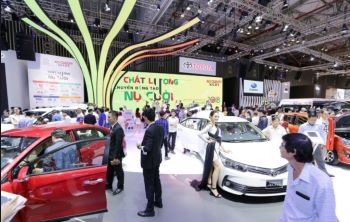Thailand Is Turning Into Regional Frontrunner In Electric Vehicle (EV), From Luxury Cars To Tuk-Tuks
BANGKOK, (PRNewswire) — By the end of 2022, a fully-electric Mercedes-EQS will roll off a production line in Bangkok to mark another milestone in Thailand’s remarkable journey from conventional automaking hub to regional frontrunner in electric vehicle (EV) production, according to an article published by the country’s Board of Investment (BOI).
BMW And Mercedes Put Autonomous Drive Collaboration On Hold Due To COVID-19
The BMW Group and Mercedes-Benz AG are putting their cooperation on development of next-generation technology for autonomous driving temporarily on hold.
Following this news, David Leggett, Automotive Analyst at GlobalData, offered his view:
“The two companies cited the cost of developing a new next generation shared autonomous drive technology platform, as well as current business and economic conditions, as reasons for putting the cooperation on hold.
The technology for fully driverless vehicles is expensive and difficult to develop and as the COVID-19 crisis continues to decimate industry sales, the immediate focus for car companies is on core activity, surviving and being competitive for the ‘new normal’ conditions ahead.
For now, BMW and Mercedes will continue with their separate current generation advanced driving assistance systems (ADAS) technologies and shelve the more ambitious collaboration – while not completely closing the door on returning to it at a later date.
They will also keep options open to work with others outside the traditional automotive eco-system as the industry and transportation space is transformed over the next decade.
The COVID-19 crisis is forcing re-evaluations of company priorities and strategies, especially future investment commitments. For many in the industry, the huge sums involved in some advanced technologies – such as automated drive – are simply not justifiable in current market conditions.”
For other exclusive articles, visit www.equipment-news.com.
Check these articles out:
Singapore’s Aerospace Infrastructure Strengthened With $500 Million Investment
LVD Launches Virtual Tech Summit For Metal Fabricators
Flexible Sawing Solution for Additively Manufactured Parts
GlobalData: Global Vehicle Market Is Over The Worst
TRUMPF Enables Automated Removal, Stacking of Parts
COVID-19 Forces Companies To Evaluate How They Operate And Embrace Technological Investment
Manufacturing Sector Maintains Growth Trajectory Amid Challenging Market Conditions
Mould Technology Solution Centre Groundbreaking Ceremony
WANT MORE INSIDER NEWS? SUBSCRIBE TO OUR DIGITAL MAGAZINE NOW!
FOLLOW US ON: LinkedIn, Facebook, Twitter
Germans Already Going With Asian Batteries
Global automakers plan to invest at least $90 billion in electric cars and batteries, the most expensive component in the vehicles, to finance hundreds of new models over the next five years.
Electric and hybrid vehicles are expected to account for 30 percent of the global auto market by 2030, according to metal consultants CRU, up from 4 percent of the 86 million vehicles sold last year.
For now, carmakers in Europe have been importing batteries from Asia, but as production ramps up that will become less viable. Setting up production in Europe would cut shipping costs by a quarter, consultancy P3 Group.
But some carmakers are not waiting for a European industry, instead signing contracts with Asian firms coming to the region. German’s BMW said it was not involved in the European alliance while Europe’s biggest automaker, Volkswagen, said it plans to get batteries from LG Chem’s Polish factory due to open this year. Mercedes maker Daimler has awarded a contract to CATL.
The European Commission’s plan calls for 110 million euros in battery related research, help for projects from a 2.7 billion euro EU innovation fund and the development of an EU “green battery” trademark. Supporters of the initiative argue Europe can carve out a niche by selling green batteries produced with renewable energy and ethically sourced raw materials.
WANT MORE INSIDER NEWS? SUBSCRIBE TO OUR DIGITAL MAGAZINE NOW!
FOLLOW US ON: LinkedIn, Facebook, Twitter




